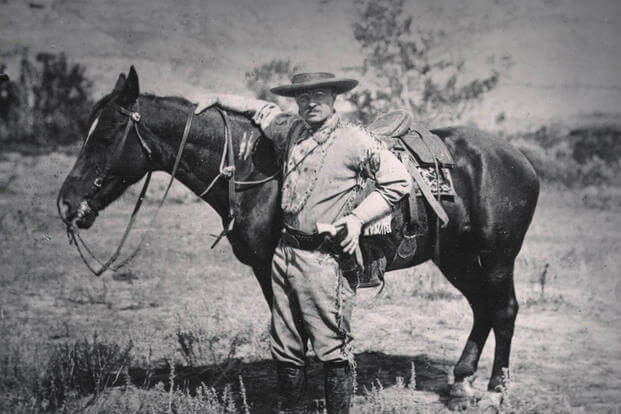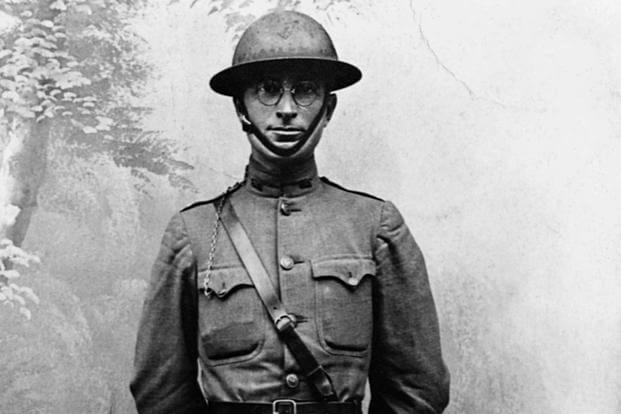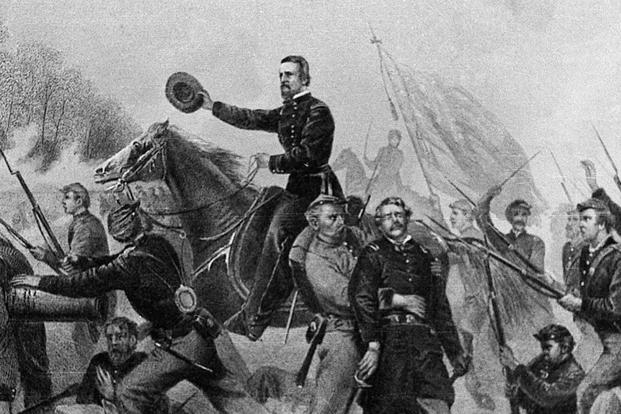Many of the men who have served as president of the United States also served in the military 31, to be exact -- and some of them are considered war heroes for their courageous acts. These are just a few of their stories.

George Washington
First president of the United States: 1789-1793
General and commander in chief, Continental Army: 1775-1783
Washington was commissioned as lieutenant colonel in 1754 and fought in the French and Indian War. The next year, as an aide to Gen. Edward Braddock, Washington distinguished himself at the Battle of Monongahela. After a French ambush, he was the only officer to survive the battle: Four French bullets left holes in his coat, and one shot off his hat but miraculously, he was unscathed. From 1759 until the outbreak of the American Revolution, Washington lived on his plantation with his wife, Martha. Washington, like many planters during that time, felt exploited by British merchants and hampered by British regulations. In 1775, he was elected commander in chief of the Continental Army, took command of the troops and spent six grueling years in battle.
Ever the brilliant tactician, one of his war strategies was to give the impression of falling back slowly, then striking in an unexpected manner with his men. In 1781, with the aid of French allies, Washington and the Continental Army soldiers forced Gen. Charles Cornwallis to surrender at Yorktown.
Once a new Constitution was ratified, the Electoral College elected Washington to be the first president, thus making him the nation’s founding father. He served two terms. At his farewell address, he urged his countrymen to beware of focusing too much on political parties and geographical distinctions.
![Commanding Gen. Ulysses S. Grant at the Battle of Cold Harbor in 1864. ( By Fawx, Edgar Guy [1] - Library of Congress, Public Domain) )](https://images03.military.com/sites/default/files/styles/full/public/2018-03/grant_crop_of_cold_harbor_photo_1200x800.jpg?itok=p1kXiBHn)
Ulysses S. Grant
18th president of the United States: 1869-1877
General, U.S. Army: 1866-1869
Grant served under Gens. Zachary Taylor and Winfield Scott in the Army during the Mexican-American War. Leading his company into the battles of Resaca de la Palma, Monterrey, Palo Alto and Veracruz, he was credited for his bravery under fire. In Monterrey, Grant risked his life by carrying a message on horseback through a sniper-riddled street; in another battle, he saved his friend and future brother-in-law, Fred Dent, after Dent had been shot in the leg. Grant rushed to pull him off of the battlefield and was almost killed by a Mexican soldier. Another soldier saved him just in time.
In 1861, when Confederate troops attacked Fort Sumter, South Carolina, Grant volunteered his services to the military again. Under scrutiny, he was assigned to command “an unruly 21st Illinois volunteer regiment.” He used lessons learned from Taylor and Scott to get his regiment ready for battle in short order.
From 1862 to the end of the Civil War, his regiment was successful in myriad battles, including some of the earliest significant Union victories. Earning the nickname “Unconditional Surrender Grant,” his military objectives were to take down Confederate armies rather than claim territories. With that in mind, he set out to track down and destroy Gen. Robert E. Lee’s Army of Northern Virginia. From March 1864 to April 1865, Grant doggedly hunted for Lee in the forests of Virginia, all while causing innumerable casualties to Lee’s soldiers.
On April 9, 1865, Lee met Grant to surrender and sign a peace agreement, thereby bringing the Civil War to an end. In 1868, he was elected as president at the age of 46. Hallmarks of his presidency are the ratification of the 15th Amendment and the establishment of the National Park Service.

Theodore Roosevelt
26th president of the United States: 1901-1909
Colonel, U.S. Army (Volunteers): 1898
After his younger years were riddled with illnesses and asthma, his father encouraged Roosevelt to develop a physical regimen to include boxing and weightlifting. He worked in law and then politics until Feb. 14, 1884, when his mother and wife died on the same day.
He took a two-year break in the Badlands of the Dakota Territory where he worked through his grief while living as a cowboy and cattle rancher. He returned to politics in 1886, and at the beginning of the Spanish-American War, he left his post of assistant secretary of the Navy to gather a volunteer cavalry called The Rough Riders.
The Rough Riders, under the direction of Col. Leonard Wood, participated in two important battles in Cuba. The first action they saw occurred at the Battle of Las Guasimas on June 24, during which seven Rough Riders were lost and 34 wounded. Roosevelt narrowly avoided bullets buzzing by him into the trees, showering splinters around his face. After leading his troops to flanking positions, the Spanish fled, and American forces then assembled for an assault on the city of Santiago through the San Juan Hills. Col. Wood was promoted in the field, and in response, Roosevelt happily wrote, "I got my regiment."
The Battle of San Juan Heights was fought on July 1, which Roosevelt called "the great day of my life." He led a series of charges up Kettle Hill toward San Juan Heights on his horse, Texas, while the Rough Riders followed on foot. He rode up and down the hill, encouraging his men with the orders to "March!" He killed one Spaniard with a revolver salvaged from the USS Maine, whose sinking in Havana had precipitated the war. The American flag eventually was raised over San Juan Heights, and the Treaty of Paris gave the United States its first overseas possessions: Guam, Puerto Rico and the Philippines.
The “splendid little war” had a lasting impact, ushering in a new era of American Empire. Roosevelt's political career ignited as he returned a war hero and national celebrity. After charging on horseback to victory at Kettle Hill and San Juan Heights, Roosevelt rode all the way to the White House just three years later.
Roosevelt was posthumously given the Medal of Honor, one hundred years later, for what was described as "…acts of bravery on 1 July, 1898, near Santiago de Cuba, Republic of Cuba, while leading a daring charge up San Juan Hill." He was later nominated as vice president to President William McKinley. Upon McKinley’s assassination, “Teedie” or “Teddy” Roosevelt became the youngest president in American history at the age of 42.
During his presidency, he fought against biased trusts and focused on foreign affairs. He received the Nobel Peace Prize for mediations he conducted during the Russo-Japanese war. Some of his most lasting achievements were in conservation: he increased national forests, public lands and irrigation systems. He left the presidency in 1909, going on an African safari, but ran again in 1912. While campaigning, a fanatic shot him in the chest. He recovered, but his words at that time would have been applicable at the time of his death in 1919: “No man has had a happier life than I have led; a happier life in every way.”

Harry S. Truman
33rd president of the United States: 1945-1953
Colonel, Army Officer Reserve Corps: 1919-1945
Although two years over the draft age limit when World War I broke out, Truman volunteered for duty and helped organize his National Guard regiment. They were called to serve in the 129th Field Artillery in France, where he was promoted to captain and assigned to Battery D, known for unruly soldiers. Truman earned the respect of those serving with him, leading them through the campaign at Meuse-Argonne.
In one particularly fierce battle, enemy fire rained down on Battery D. Many of Truman’s men lost heart, and some even fled. Truman, unafraid, rallied his men. He later recalled the battle: “I got up and called them everything I knew,” he said, especially focusing on their bravery and mothers -- two subjects, when disparaged, were sure to catch their ears. “Pretty soon they came sneaking back.” To his men, Truman appeared fearless.
After the war, he returned home and progressed through politics, first as a judge, then senator. In 1944, Franklin D. Roosevelt was elected as president for his fourth term, with Truman as his vice president. Weeks later, Roosevelt died of a stroke, and Truman was sworn in as president.
In his first six months in office, he announced the Germans’ surrender, signed the order to drop atomic bombs on Hiroshima and Nagasaki, which effectively ended World War II, and signed the charter ratifying the United Nations. In 1948, during the Cold War, Russians blockaded western segments of Berlin, so Truman provided supply airlifts to Berlin until the Russians relented. He also helped establish the North Atlantic Treaty Organization in 1949. Truman introduced the “Fair Deal” program at the 1949 State of the Union Address ,which included universal health care, an increased minimum wage and increased funding for education.
While racial discrimination was banned in hiring processes for federal government, the military was desegregated and the minimum wage was increased, national health insurance and additional education funds were rejected. When Communist North Korea attacked South Korea in 1950, Truman saw it as a challenge that, if left unchecked, would escalate to another world war, so he quickly committed United States military to the aid of South Korea. The mission there quickly changed from a plan to eradicate communists, to simply containing and preserving independence for South Korea.
In 1971, Congress attempted to bestow Truman with the Medal of Honor, but he refused, explaining in a letter, “I don’t consider that I have done anything which should be the reason for any award, Congressional or otherwise.”



